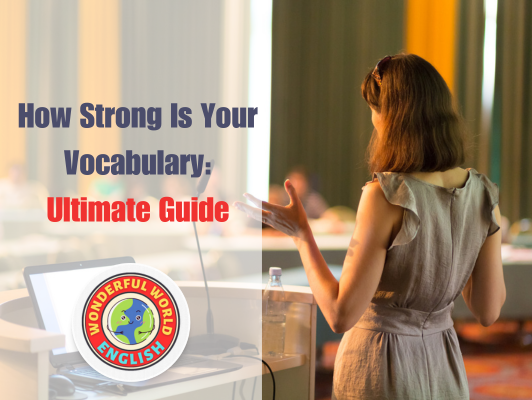Contents
Toggle
Meet David De’ Ath, founder, editor, and writer at Wonderful World English. With his extensive background as an English teacher, David provides valuable insights and practical tips on ESL for students and teachers alike.
Assessing the strength of one’s vocabulary is an insightful exercise. It can reveal not only the breadth of one’s language proficiency but also their ability to communicate clearly and effectively.
Vocabulary is a pivotal tool in articulation, comprehension, and the conveyance of complex ideas.
In various professional, academic, and social contexts, the strength of vocabulary is often seen as a reflection of knowledge and intellectual capacity.
To improve vocabulary, one must actively seek new words, understand their nuances, and incorporate them into everyday language.
There are numerous methods and resources available that can assist in this endeavor. Each is tailored to different learning styles and objectives.
Engaging with vocabulary quizzes can be a practical start in gauging one’s current lexicon and highlighting areas for growth.
Key Takeaways
- Vocabulary strength is indicative of linguistic skill and the ability to communicate effectively.
- Regular practice and diverse learning tools can enhance one’s vocabulary.
- Vocabulary proficiency has practical applications across various life aspects.
The Importance of Vocabulary
A robust vocabulary is a vital tool for effective communication and understanding in various contexts.
The breadth of one’s vocabulary can influence the clarity and precision of their communication.
Definition and Fundamentals
Vocabulary consists of words that enable individuals to articulate their thoughts and understand others.
It is the cornerstone of language proficiency and encompasses not only the number of words one knows but also the depth of their understanding of these words.
Vocabulary and Communication
Effective communication relies heavily on vocabulary. A person with an extensive vocabulary can convey their ideas more succinctly and persuasively.
This range allows for the articulation of nuanced thought and enhances the speaker’s ability to inform, persuade, or entertain their audience.
Vocabulary in Context
Context matters significantly when assessing the power of vocabulary. Words can have different meanings depending on their usage within a conversation, a text, or a specific situation.
Understanding the context in which words are used is as important as knowing their definitions. This is because it ensures accurate comprehension and expression.

Ways to Enhance Your Vocabulary
Strengthening one’s vocabulary goes beyond memorization—it’s an active process that can be both educational and enjoyable.
Through a variety of methods like consistent reading, engaging with interactive materials, and practicing the use of new words, anyone can enhance their vocabulary effectively.
Reading and Exposure
Reading is the cornerstone of vocabulary enhancement.
Individuals should read diversely across different genres and subjects to encounter a rich array of words.
Focusing on contextual learning helps with understanding the meaning of new words, as demonstrated through their use in phrases or narratives.
The habit of reading extends beyond books to include articles, reports, and quotes that can provide insights into word usage and nuance.
For additional context, engaging with movies and TV shows also offers valuable exposure to language in different cultural and situational settings.
Interactive Learning and Games
Interactive learning approaches make enhancing one’s vocabulary a fun and dynamic experience.
By incorporating games like crosswords, Scrabble, or vocabulary apps, learners can expand their word bank in an engaging manner.
These tools often use repetition and varied levels of difficulty to aid in the practice and retention of new words.
Online platforms provide instant feedback and the chance to listen to correct pronunciations, increasing the effectiveness of the learning process.
For some great examples of activities to help build vocabulary skills, check out the link below!
Related: Fun Vocabulary Activities: 10 Ways to Boost Word Skills
Practice and Usage
Practice, over time, solidifies the acquisition of new vocabulary.
One can implement new words into their spoken and written language in conversations, journals, or creative writing.
Real-world application through practice ensures that the words are integrated into one’s active vocabulary.
Regular usage is the key to retention. It is helpful to speak out loud or use the new vocabulary in sentences to better grasp their meanings and applications.

Vocabulary Building Tools and Techniques
In the journey to enhance English vocabulary, incorporating a variety of tools and strategies ensures a comprehensive approach to learning new words.
Below are specific methods to employ that can be both engaging and effective in expanding one’s lexicon.
Vocabulary Journals and Lists
Keeping a vocabulary journal is an essential practice for learners aiming to boost their word bank.
This traditional yet powerful technique involves writing down new words encountered during reading or conversation, along with their meanings and contextual sentences.
Such personalized word lists serve as a reference and reinforcement tool, enabling learners to revisit and cement their understanding over time.
Technology in Learning
Technology plays a pivotal role in modern vocabulary learning.
Engaging in word games such as Scrabble, Boggle, or crossword puzzles can make the process of learning new words enjoyable.
Apps designed to learn and test English vocabulary provide interactive experiences tailored to all levels, turning what could be a mundane task into a dynamic learning exercise.
Learners can also leverage play word games within some vocabulary-building apps.
This introduces a competitive aspect that can increase motivation and retention of new words.
Related: Best Games to Learn English: Ultimate Guide

Measuring Vocabulary Strength
One’s vocabulary can be robustly tested and assessed through a variety of methods.
These range from structured vocabulary tests and quizzes to more reflective self-assessment strategies.
Vocabulary Tests and Quizzes
Structured vocabulary tests are an effective way to measure one’s knowledge of words, including synonyms and usage in context.
Online tools like the Merriam-Webster Vocabulary Quiz offer a simple yet comprehensive approach.
These tests typically present a series of questions or a 10-question format, challenging individuals to identify the correct meaning or synonym of a word.
Quizzes often incorporate a game-like aspect, making learning both educational and entertaining.
Websites like Preply’s English Vocabulary Test provide a platform where one can gauge their vocabulary against standards of native speakers.
Self-assessment Strategies
Self-assessment is a reflective approach to evaluate one’s vocabulary strength.
Individuals evaluate their daily language use by noting down new words they encounter and actively using them in sentences.
They may also periodically review this list to self-test their retention of the words and their meanings.
This strategy involves a personal commitment to expanding one’s vocabulary through consistent practice and reinforcement.
It is a fluid and continuous process, adaptable to each individual’s unique learning pace.

Applications of a Strong Vocabulary
A strong vocabulary fosters both professional and academic achievements and enhances social interactions.
It provides individuals with a potent tool for communication, allowing them to articulate thoughts and ideas with precision and confidence.
Mastery of words boosts efficacy in speaking and writing, which can be evident in every stage of life, from a child to a student, and eventually as an experienced writer or professional.
Professional and Academic Success
A person with a robust vocabulary can elevate their writing skill, which is an essential asset in the academic and business world.
Students with a broader range of words can interpret and engage with complex materials more effectively, while professionals can communicate their proposals and reports more persuasively.
Employers often value employees who can express themselves clearly and effectively, seeing it as a sign of confidence and intelligence.
- Advantages for Students:
- Improved comprehension and expression in exams and essays.
- Better performance in verbal reasoning and standardized tests.
- Advantages for Professionals:
- Enhanced ability to articulate complex concepts.
- Increased persuasion skills in negotiations and presentations.
Social Interactions
Socially, when individuals harness the power of a strong vocabulary, they are able to navigate conversations with greater ease and assurance.
One’s ability to communicate effectively can lead to richer and more meaningful engagements as they are equipped to share their thoughts and ideas with others in a clear, articulate manner.
This can also build self-esteem and lead to more substantial connections with peers.
- Building Relationships:
- Clear articulation of feelings and perspectives to foster deeper connections.
- Improved grasp of social dynamics through nuanced language.
- Expressing Individuality:
- Precise language use to express complex emotions or opinions.
- Demonstrating knowledge and intellect, thereby increasing one’s influence within a social group.
Incorporating a strong vocabulary into daily communication can unlock significant benefits in a variety of settings.
It is a cornerstone that supports one’s personal development and engagement with the world at large.

Conclusion
Assessing and enhancing one’s vocabulary is not merely an academic exercise; it’s a fundamental aspect of personal and professional development, facilitating clearer communication and a deeper understanding of the world.
A strong vocabulary enables individuals to express their thoughts and ideas more precisely and engagingly, impacting their interactions across various contexts.
By actively seeking new words, understanding their nuances, and incorporating them into daily use, one can significantly improve their language proficiency.
The journey of vocabulary enhancement is continuous, supported by a range of tools and methods that cater to diverse learning styles, ultimately enriching one’s ability to articulate and comprehend effectively.
This endeavor not only enhances linguistic skills but also opens doors to a more nuanced understanding and appreciation of the power of language.
We hope you find value in this information; you can contact us if you require any support.
Have a wonderful day!
Image Attribution: All images licensed via canva.com





